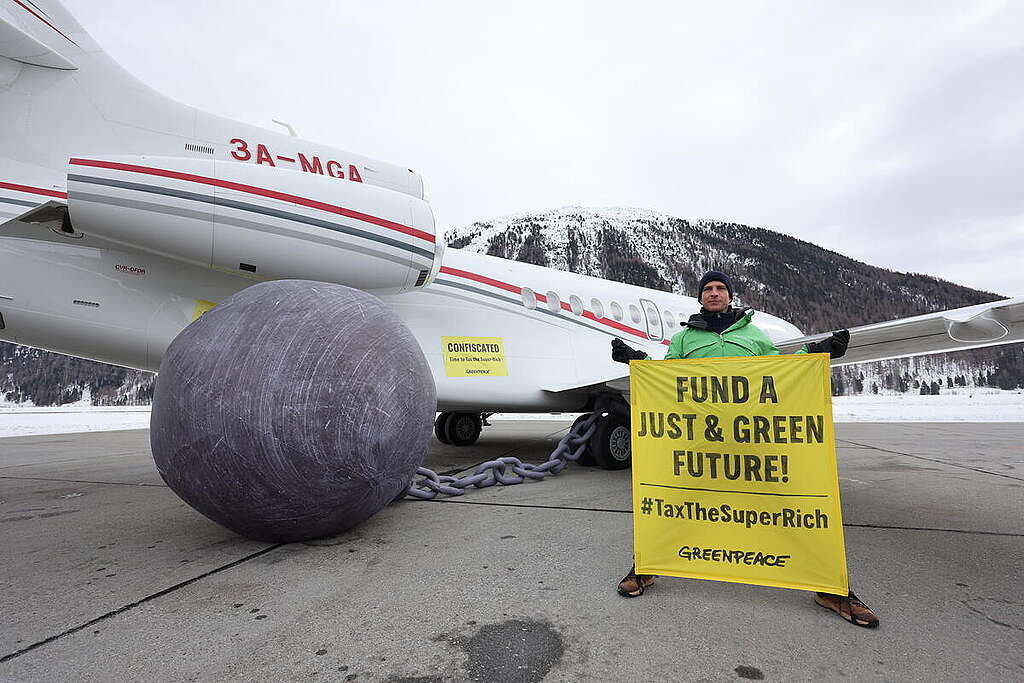Taxing Oil Giants: Can It Fund Climate Solutions?
As storms, floods, fires, and droughts are hitting us more frequently and with greater intensity around the world, the costs of the climate crisis are going up significantly. Bold taxes or fines on oil and gas corporations would help to raise vital revenues which should be used to ensure that communities are given the support they need to recover, rebuild and invest in climate solutions.
Between 2000 and 2019, the profits of the fossil fuel industry amounted to US$31.315 trillion. This equates to about US$4.3 billion per day! This is just one snapshot of the amount of money that could be reclaimed to support climate-impacted communities – but only if governments have the bravery to seize some of the huge opportunities this year to make polluters pay.
Given that climate damage to our farming, infrastructure, productivity, and health could knock US$38 trillion a year off the global economy by 2050, action needs to be taken urgently to prevent the worst impacts.
Using the money raised through ambitious polluter taxes and fines, governments could afford to introduce genuinely transformative policies so that citizens are protected from the growing costs of climate change, and our society can become more sustainable and resilient for the future.
Levies on the extraction of fossil fuels and bolder taxes on profits are just two examples of the types of polluter pays mechanisms that governments should begin rolling out without delay. For example, if a fossil fuel extraction levy was imposed by 38 of the richest countries, beginning at a low rate of $5 per tonne of CO2-equivalent and increasing by $5 per tonne each year, this could raise a total of $900 billion by 2030. This idea of a 'Climate Damages Tax' is something that over 100 climate groups around the world are supportive of.
Applying that formula, Greenpeace International and Stamp Out Poverty found that a minimal tax of $5 per tonne of CO₂-equivalent on the fossil fuel extraction of TotalEnergies in 2023 alone could have covered the costs of Kenya's 2024 floods 30 times over.
Here's a few other examples of the sorts of things that our governments could invest in through making oil and gas polluters pay:
Taxing and fining oil and gas companies more for climate destruction is a no-brainer. It can benefit everyone in the face of growing climate shocks. Importantly, it's also a way to ensure that the people most impacted by climate change - living in the greatest poverty and least responsible for causing the climate crisis in the first place - are given the support they need and deserve. For example, despite causing only a small fraction of overall global emissions, six typhoons struck the Philippines in less than a month at the end of 2024.
Climate loss and damages in lower-income countries are estimated to cost upwards of US$388 billion per year. Yet the total support pledged from wealthy nations so far would cover less than 0.2% of this figure (as at January 2025). This is despite richer countries agreeing to create a dedicated UN fund for loss and damage in November 2022.
Over and over, richer countries have not met existing climate funding commitments of US$100 billion a year. They've also not met promises around raising funding to support developing countries adapt to climate impacts. This has left many countries and communities more exposed to loss and damage. Because they're unable to put money into easing and adapting to climate change, and build up their ability to withstand climate impacts. Experts say a minimum of US$1 trillion per year is now required in grants to deliver on Global North countries' obligations to low-income countries with climate finance.
Taxes and fines must of course be designed in a way that is fair and proportionate. For example, it is crucial that steps are taken to prevent any knock-on increases in prices and the cost of living, especially for people living in poverty. Gender analysis should also be conducted to inform the design of any tax or penalty mechanisms to mitigate against any risks of women and girls being disproportionately impacted. Any costs should fall primarily on investors in these polluting companies. Furthermore, complementary regulations are needed to help speed up a managed phase out of fossil fuels altogether – because we urgently need to stop this damaging industry from fuelling the climate crisis in the first place.
To put climate justice into practice, governments must make fossil fuel companies pay up. Alongside investing in solutions to protect communities from climate impacts at home, richer countries should put a significant portion of that money into the loss and damage fund, and other climate financing they've promised and owe to Global South countries.
Join and share the Polluters Pay Pact now so that we can work together to pressure governments throughout this year to ensure that oil and gas corporations pay their fair share! Together, we can build a safe, resilient future for everyone!
Rebecca Newsom is the Global Political Lead for Greenpeace's Stop Drilling, Start Paying campaign, based in London.
https://www.greenpeace.org/international/story/74239/a-multi-billion-dollar-question-what-good-can-come-from-taxing-oil-and-gas-corporations-for-climate-damages/
View Original | AusPol.co Disclaimer
